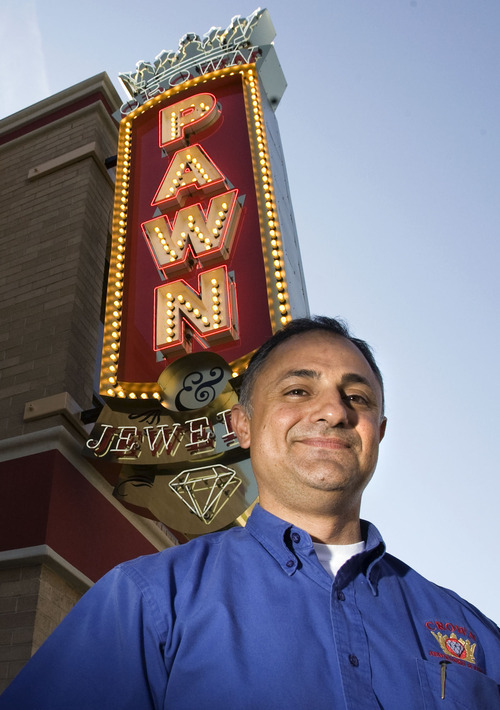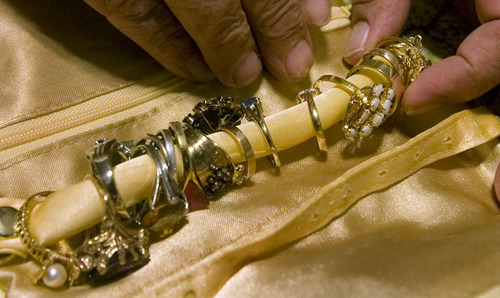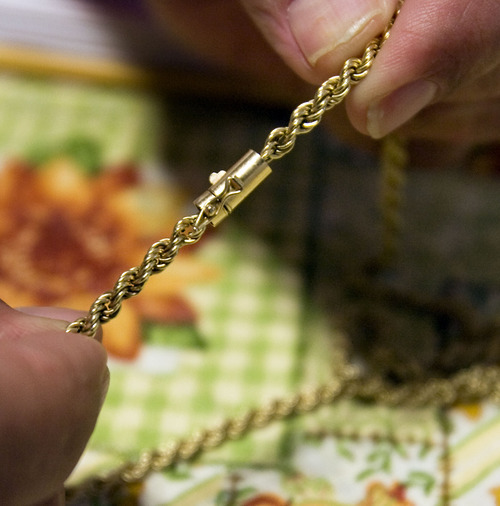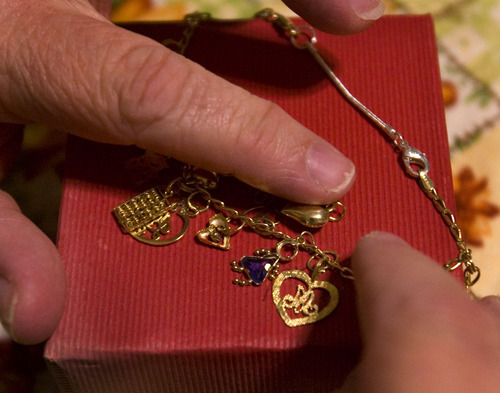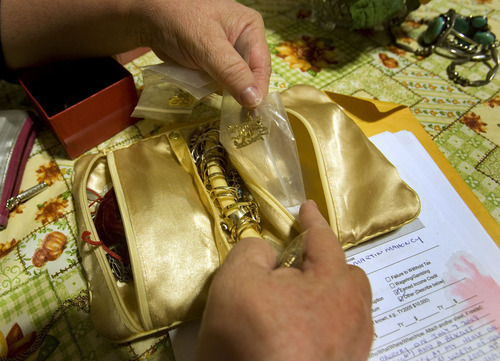This is an archived article that was published on sltrib.com in 2011, and information in the article may be outdated. It is provided only for personal research purposes and may not be reprinted.
Bob and Carol Mahoney became victims when their then-33-year-old son pawned dozens of pieces of their stolen jewelry — one an irreplaceable token of love passed from mother to daughter.
That was hard enough.
But the Kearns couple felt victimized again after becoming entangled in Utah laws governing the state's pawn and secondhand-shops industry. They say the shop that bought their treasures was reluctant to part with them free of charge, and some of their jewelry was melted down and damaged before either they or police had time to stop it.
"It's all slanted with the thief and the pawn shop, not the victim," Carol Mahoney said.
Two years later, the two are still fighting, this time to try to implement changes on behalf of future victims. But critics say the odds stacked against victims have gotten worse with tweaks to state laws that took effect in May and might make the Mahoneys' quest more difficult.
They say the law is now tilted unfairly toward merchants, punishing crime victims and making investigators' jobs more complicated. Business owners contend their property rights are now adequately protected. A standing state board that brings together representatives with the pawn, secondhand and coin dealers industry, along with law enforcement and prosecutors, is trying to hammer out recommendations for lawmakers in the next session.
Previously the law was less restrictive about when police could seize property. Now they can only seize it under specific circumstances. That usually leaves victims with three options:
• To get an item back for free, the seller must be successfully prosecuted for theft by deception and restitution ordered for the shop.
• A victim can buy the item back at the same price the shop purchased it.
• The victim can give up and walk away.
Salt Lake County Sheriff Jim Winder said it's been frustrating for victims to locate stolen items and be unable to recover them immediately at no cost. Utah Division of Consumer Protection records show there are 116 active pawn licenses and 325 active secondhand merchants licenses.
"The way the law is written now predominately favors the property interests of the secondhand dealer," he said. "It should be victim-centric."
The fallout for police has been palpable.
"I can tell you there are a couple of cities in our [area] that are just madder than hell about this because our citizens are mirroring this problem on us," Winder said.
But Mike Katsanevas, owner of Crown Jewelers & Pawn and also chairman of the state's Pawn Shop/Secondhand Merchandise Dealers Advisory Board, said the changes were needed.
Although Unified and Salt Lake City police have rigorous standards in seizing property that was allegedly stolen then pawned or sold to businesses, he said other departments were less stringent. That cost some businesses thousands of dollars and didn't result in prosecution because the victim refused to proceed once he or she got the item back.
Katsanevas said in about 70 percent of the crimes one family member steals from another, often leaving the victim reluctant to prosecute. If the item is seized by police, returned to the victim, and the victim declines to prosecute, he said the shop then becomes the victim, losing out on its investment and losing any opportunity to seek restitution.
The new law forces everyone to follow through on the prosecution, he said.
"Don't get me wrong," he said. "I truly feel compassion for any family. I mean to have your child, relative steal from you is the worst of the worst. But I don't want to become a victim because of your lack of moxie to prosecute."
Salt Lake County Deputy District Attorney Brad Cooley, who serves as the district attorneys' representative on the advisory board, said some victims do try to pursue criminal charges, but sometimes his office can't accept cases because there is not a reasonable likelihood of conviction. That could be because of inaccurate or incomplete pawn tickets or because there's not enough evidence to prove the person who pawned the property either stole it or knew it was stolen.
There have also been cases where a victim had a truck full of expensive tools stolen but can't afford the pawn fee to buy them back, Cooley said. But without those tools, he can't work and thus loses his job.
Utah law makes no exceptions for the victims who do try to pursue justice, but for reasons out of their control cannot obtain a successful prosecution or for those employees or employers who need stolen items to earn their livelihood, he argues.
"I'm not a fan of the statute," Cooley said. "I just don't think just because the pawn shop paid someone 30 bucks for your digital camera it should be theirs unless all the cards fall in your favor."
Bob Mahoney said the pawn shop eventually returned some of the couple's stolen items, but some of those were damaged, with missing clasps or jewels and cut chains. They claim at least $5,000 worth of jewelry was never returned even though they followed through and successfully prosecuted their son, Ryan William Mahoney, 36.
Utah courts sentenced him to probation for attempted theft by receiving stolen property and attempted theft by deception. He was ordered to pay his parents more than $7,000 in restitution and the pawn shop more than $495. Court records show neither have received a cent. The Mahoneys have also filed a civil suit in 3rd District Court against the pawn shop.
Attempts to reach Ryan Mahoney for comment were unsuccessful.
One item never recovered was an heirloom bracelet that Bob and Carol Mahoney estimate was worth about $4,000. It also holds enormous sentimental value because it was given to Carol as her mother lay dying.
The two tried unsuccessfully to recover it, but learned after 15 days — the state's required holding period for jewelry and most other items — the pawn shop had it melted down because of its value in gold.
The Mahoneys are pushing to extend that holding period to at least 60 days because they said it's now not enough time for investigators or victims to locate their stolen items in time to prevent them from being sold or destroyed. Once police locate an item, they can place a hold on it, requiring a shop to not sell it during an investigation or until prosecution.
It can take up to 10 to 15 days for a detective to be assigned a case, Winder said.
"The 15 days is not sufficient for us to make a legitimate effort at recovery," he said of the law.
Katsanevas said generally only 1 of 2,000 pawn tickets written in Utah will come under investigation and most calls about questionable tickets come within the 15-day window.
Business owners contend that metals — like jewelry — need to be liquidated as soon as possible because there is a market value that fluctuates.
He said the hold period was extended by agreement from 10 to 15 days a few years ago and believes it is sufficient, but would be open to extending it as long the extension was across the board and not focused on one industry.
But the hold period also has unintended consequences because shops are sometimes disposing of evidence.
"It also incentivizes the burglaries because the pawn shop will take it [the evidence] and get rid of it," Winder said.
Cooley said if stolen items have been disposed of, it can make prosecution more challenging because prosecutors determine restitution and whether crimes are misdemeanors or felonies based on the value of what was stolen. If items have been melted down the value is difficult to prove without receipts or an appraisal.
"It wouldn't hurt them one bit [to hold it longer]," Bob Mahoney said. "This could stop a lot of things if you could recover your gold."
jstecklein@sltrib.comTwitter: sltribjanelle —
Police seizures
There are four reasons police can seize items from pawn shops, secondhand shops and coin shops under Utah law:
To perform chemical testing
To perform fingerprinting
The item is needed as a trial exhibit.
The item contains sensitive identifying information. —
Protect yourself
Experts recommend taking photos of all the items you own, including jewelry, and documenting any serial numbers.
Store those pictures and serial numbers somewhere safe. If you become a victim, you can give copies to law enforcement to help them locate your items and know specifically what to search for. Those photos can also help when trying to file insurance claims.




